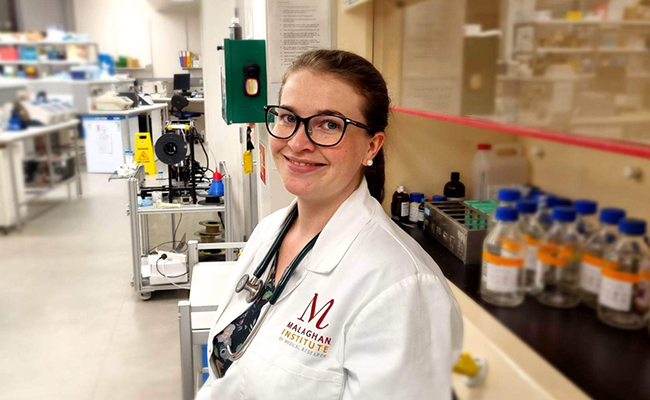
Dr Ellie-May Jarvis has taken a big leap forward in her dream of becoming an medical oncologist, with her PhD in cancer research.
Ellie-May Jarvis walked across the graduation stage on 13 May with both a medical degree and a PhD from the University of Otago after completing the University's demanding MB ChB/PhD Programme.
Dr Jarvis took two years out of her medical degree to work part-time on her PhD, while at a later stage also juggling full-time work as a junior doctor at Wellington Hospital.
Though she began this journey in Dunedin, her PhD was completed on the Wellington campus and her research was based at the Malaghan Institute of Medical Research, an independent immunology research centre in the capital.
“I am very grateful to the Otago Medical School, the Wellington campus and the Malaghan Institute of Medical Research for allowing me the opportunity to undertake this study. Additionally, I would like to thank the Prostate Cancer Foundation of New Zealand and the Cancer Society Wellington for funding my clinical studies,” Ellie-May says.
“I was incredibly well supported by my supervisors and Otago staff through what is an unusual and challenging combination of degrees.
"They checked in regularly regarding my progress not just academically, but also ensured I had the necessary financial and pastoral support to get through.”
She says the relationship between the University of Otago, Wellington, and the Malaghan Institute of Medical Research presented her with the platform to be a part of exciting, word-class research.
Her research focused on innate-like T-cells to better understand the function of these in men with prostate cancer to inform the design of anti-cancer immune system targeting therapies called immunotherapies.
She observed an impairment in a subset of T-cells called MAIT (Mucosal Associated Invariant) cells associated with the expression of an inhibitory receptor called PD-1.
“In a laboratory-based study I was able to combine MAIT cell activation and a checkpoint blockade therapy against PD-1 to kill prostate tumours, though this will need further work to translate into a viable therapy,” Ellie-May says.
Having wanted to be an oncologist since the age of 13, she is elated to see her hard work reach this point.
“I was heavily influenced by the experiences of young people with cancer that I had known in my West Otago community, in particular the need for them to travel to Christchurch to receive medical care.
“I wanted to do my part and, as I progressed through medical school, I realised that many of the most notable cancer treatment findings still needed to be made and so I viewed my PhD as an opportunity to gain research skills and to participate in this.”
She is now working as a medical registrar at Wellington Hospital and continuing towards her goal of becoming a medical oncologist.
- Kōrero by Division of Health Sciences Communications Adviser, Kelsey Schutte.
